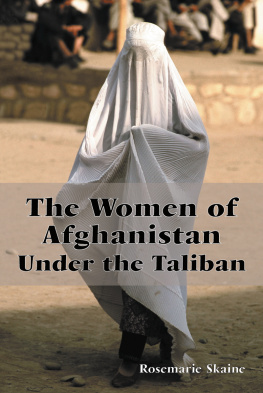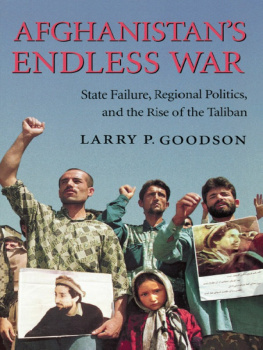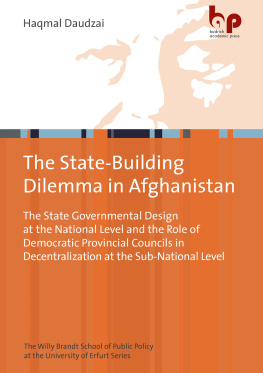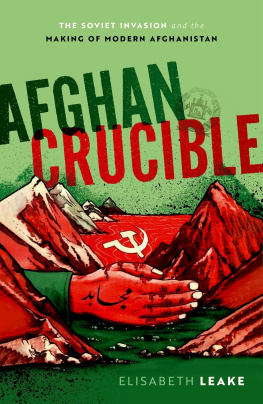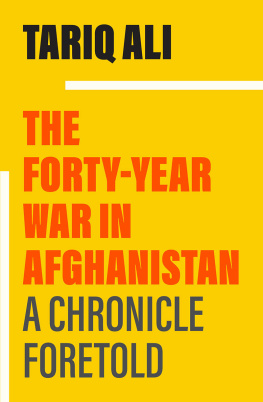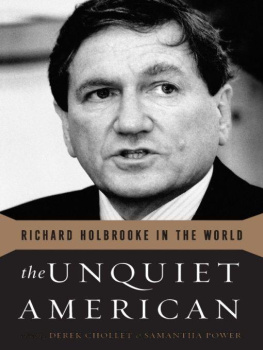Afghanistan from the Cold War through the War on Terror
Afghanistan from the Cold War through the War on Terror
BARNETT R. RUBIN


Oxford University Press is a department of the University of Oxford.
It furthers the Universitys objective of excellence in research, scholarship,
and education by publishing worldwide.
Oxford New York
Auckland Cape Town Dar es Salaam Hong Kong Karachi
Kuala Lumpur Madrid Melbourne Mexico City Nairobi
New Delhi Shanghai Taipei Toronto
With offices in
Argentina Austria Brazil Chile Czech Republic France Greece
Guatemala Hungary Italy Japan Poland Portugal Singapore
South Korea Switzerland Thailand Turkey Ukraine Vietnam
Oxford is a registered trade mark of Oxford University Press
in the UK and certain other countries.
Published in the United States of America by
Oxford University Press
198 Madison Avenue, New York, NY 10016
Oxford University Press 2013
All rights reserved. No part of this publication may be reproduced, stored in a retrieval system, or transmitted, in any form or by any means, without the prior permission in writing of Oxford University Press, or as expressly permitted by law, by license, or under terms agreed with the appropriate reproduction rights organization. Inquiries concerning reproduction outside the scope of the above should be sent to the Rights Department, Oxford University Press, at the address above.
You must not circulate this work in any other form
and you must impose this same condition on any acquirer.
Library of Congress Cataloging-in-Publication Data
Rubin, Barnett R.
Afghanistan from the Cold War through the War on Terror / Barnett R. Rubin.
p. cm.
Includes bibliographical references and index.
ISBN 978-0-19-979112-5 (hardback: alk. paper) 1. AfghanistanPolitics and government
19892001. 2. AfghanistanPolitics and government20013. Afghan War, 2001
4. War on Terrorism, 20012009. 5. AfghanistanForeign relations21st century.
6. Postwar reconstructionAfghanistan. 7. Local governmentAfghanistan.
8. Taliban. 9. Islamic fundamentalismAfghanistan. I. Title.
DS371.3.R83 2013
958.104dc23 2012046996
9780199791125
1 3 5 7 9 8 6 4 2
Printed in the United States of America on acid-free paper
To Lakhdar Brahimi and Richard Holbrooke: thanks for the opportunity to serve.
CONTENTS
With Helena Malikyar
With Andrea Armstrong
With Humayun Hamidzada and Abby Stoddard
With Abubakar Siddique
With Jake Sherman
With Ahmed Rashid
For almost three decades, Barnett Rubin has been a most acute observer of Afghanistans iterated wars, as well as an activist in the protracted search there for justice and peace. For the past dozen years, his perch for that work was the NYU Center on International Cooperation, where I have the privilege of being his colleague.
Barney is not your average scholar. Like the best academics, he is deeply versed in the literature and theory of conflict, in the methods of empirical research, and in the region that has now been most of his life work. Unlike most academics, he has the kind of in-depth knowledge of the culture, history, and people of Afghanistan and its neighborhood that often surprises Afghans themselves. I got a glimmer of how unusual is his expertise when I was given an account of a meeting he attended along with an Iranian diplomat in Dubai (this at a time when only a handful of Americans had any contact with official Iran), conducted partly in terms of trading refrains from Iqbal, the Indo-Pakistani poet-philosopherin Farsi. Barneys insight into the relationships that shape the local and subregional dynamics of the Afghan wars is unparalleled.
After September 11, and through 2008, Barney was called on by the UNs Lakhdar Brahimi, by the Afghan authorities, and by the NATO allies with increasing frequencyand with increasing despair about the missed opportunities, errors in misunderstanding, and mistakes of strategy that characterized much of the coalition effort. Barney was never content to carp on the sidelines, though, but took every flight and invitation to publish, brief, or advise to help shape, wherever he could, a more productive engagement.
One person who saw Barneys unique value was Richard Holbrooke. They had worked together when Barney ran the Council on Foreign Relationss groundbreaking project on preventive action in the mid-1990s, when Barney was also writing his seminal books The Fragmentation of Afghanistan and Blood on the Doorstep. When Holbrooke became chair of the board of the Asia Society, he called on Barney to work on their Afghanistan program, culminating in an influential study, Back from the Brink, cochaired by Barney and master diplomat Tom Pickering. When President Obama and Secretary Clinton tapped Holbrooke to serve as special envoy for Afghanistan and Pakistan, he again turned to Barney for advice. For two years, Barney gave frequent and always richly informed advice to Holbrooke and the secretary.
One of the things that distinguish CIC from many academic centers is the understanding that policy advice is conveyed most effectively through people, not papers. We recruited highly talented people such as Jake Sherman, Rahul Chandran, and Tom Gregg to complement Barneys work on Afghanistan, enabling him to devote a substantial portion of his time to advising Holbrooke, as well as maintaining his unique dialogue with the Afghans and their neighbors. I am very grateful to our donorsespecially the Norwegian Ministry for Foreign Affairsfor supporting our Afghan program generously, but more important, flexibly. Through and around Barneys effort, CIC, Norway, and the U.S. government have become partners in the search for an end to this long episode of the Afghan wars. We were together in Dubai for a joint CIC/Norwegian workshop on the regional dynamics of a potential Afghan peace, whose outcome Holbrooke was anticipating, when he was suddenly and tragically felled by an aortal aneurysm.
All wars shape their protagonists, but some wars shape more than just those who fight them. The U.S. war in Afghanistan is one such war. The U.S. effort to eliminate or at least contain the threat posed by al-Qaeda, the allied effort to rebuild Afghanistan after this and previous wars, NATOs role in both military and civilian operations, and the regional and international effort to stem the flow of opium from Afghanistan all have reshaped the way international security is perceived and managed. For readers who want a richer understanding of the Afghan war, or of how that war has shaped the broader international system, this compilation of Barneys writings provides both evidence and insight. For those who wish to understand what comes next, its an essential read. The critical reader will notice that most of the ideas that now shape U.S. and international approaches to Afghanistan found an airing in Barneys writing well before they came to fruition in policy. Most important, Barney was an earlyand frequently lonelyvoice for reconciliation when many in Washington preferred to believe that military strategy alone could prevail. Presidents Obama and Karzai have come around to Barneys viewnot least because Barney was dogged in explaining the rationale for reconciliation to Holbrooke, notwithstanding its costs and its discomfort, and strategies for achieving it. When Marc Grossman took over as U.S. special envoy, he too sought Barneys help and advice, and reconciliation has been a central theme of the U.S. effort since. As I draft this introduction, new agreements among the Taliban, President Karzai, and the United States herald the first public step in a move toward a political settlement to end this round of Afghanistans long war.


